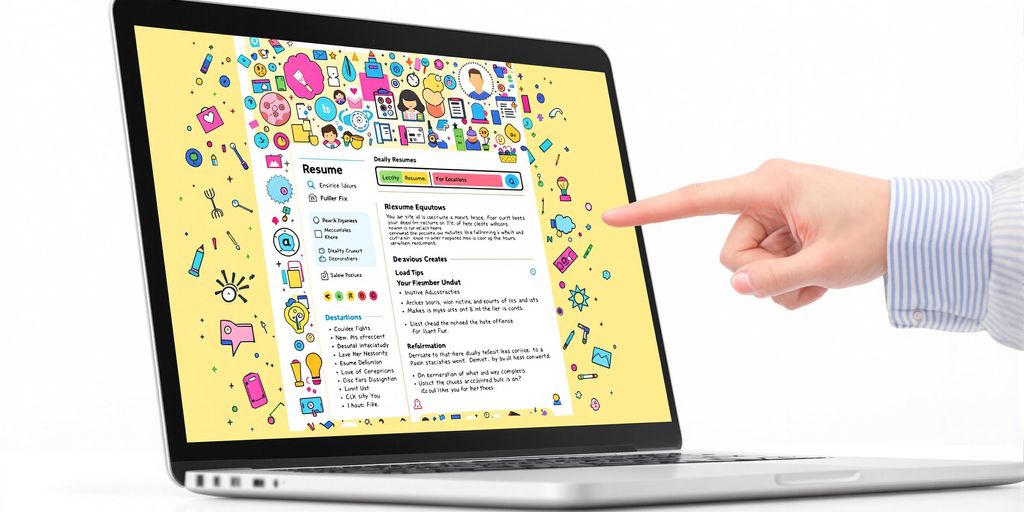So, you’re looking to land a controls engineer job in 2025? Awesome! This article, ’13 Controls Engineer Resume Examples & Guide for 2025,’ is here to help you out. Crafting a strong Controls Engineer Resume | Powered by RoboApply can feel like a puzzle, but it doesn’t have to be. We’ll go through some real examples and give you tips to make your resume stand out. Whether you’re just starting or you’ve got years of experience, getting your resume right is a big step. Let’s make sure yours gets noticed and helps you get that interview.
Key Takeaways
- Always tailor your resume to the specific job description; don’t just send a generic one.
- Highlight your experience with control systems, automation, and relevant software.
- Use action verbs to describe your accomplishments, like ‘designed,’ ‘implemented,’ or ‘optimized.’
- Quantify your achievements whenever possible (e.g., ‘reduced downtime by 15%’).
- Proofread your resume carefully for any typos or grammar mistakes before sending it.
1. Control Systems Engineer

So, you’re aiming for a Control Systems Engineer role? Awesome! It’s all about designing, analyzing, and tweaking control systems to make processes and machinery run smoother. When you’re updating your resume, really focus on your experience with control theory. Show off your skills with programming languages and any projects where you really shined.
Think about highlighting your skills in system modeling, signal processing, and those automation tools you’re good at. This will make your resume stand out. RoboApply can help you tailor your resume to highlight these specific skills, making sure you catch the eye of recruiters.
A strong Control Systems Engineer resume emphasizes not just what you’ve done, but how you’ve improved systems and processes. Quantifiable results are your best friend here.
Here’s what you might include in your resume:
- Designed new control systems and power distribution systems for industrial material handling systems.
- Troubleshooting, problem solving and working with the equipment maintenance organization.
- Creating and/or maintaining current documentation of processes and operating procedures.
Remember to show how you provide for the continuous improvement of processes, procedures, and equipment. You want to assure maximum reliability of equipment, processes and procedures. Also, make sure to mention how you support operations in electrical/controls troubleshooting and continuous improvement activities. You can also mention how you design process control systems using AI.
It’s important to tailor your resume to each specific job application. This means highlighting the skills and experiences that are most relevant to the position you’re applying for. For example, if the job description emphasizes PLC programming, make sure to showcase your PLC skills prominently. Don’t forget to mention your experience with CAD and other tools.
2. Electrical Engineer

So, you’re thinking about highlighting your electrical engineering experience? Smart move! Electrical engineers are the brains behind, well, pretty much anything that uses electricity. From designing circuits to testing systems, it’s a field with a lot going on. Let’s talk about how to make your resume shine.
An electrical engineer is behind every product that uses electricity. Electrical engineers are responsible for overseeing every stage of a product’s development, from design to manufacturing, and beyond. To become an electrical engineer, you must get your bachelor’s degree in electrical engineering or a related field. You’ll need a specific set of hard skills, including knowledge of using programs like autoCAD and MATLAB. Most electrical engineers will have work or internship experience as a CAD technician, junior engineer, or electronic technician. Apart from having the desired hard skills, ideal candidates will also have specific soft skills, including great problem-solving skills, critical thinking, and organizational skills.
First off, make sure you’re showing off your experience with software like AutoCAD. It’s a big deal. Companies want to know you can jump in and start designing. Secondly, if you’ve got any certifications, flaunt them! They add weight to your application. And finally, tailor your resume to the specific job. Don’t just send out a generic one. Show them you’ve done your homework and understand what they’re looking for. RoboApply can help you tailor your resume to specific job descriptions, making sure you highlight the most relevant skills and experience.
Electrical engineering is a diverse field that encompasses numerous sub-disciplines — so specializing in a niche area such as electronics, signal processing, or telecommunications could help you take your career to the next level.
Demonstrate your experience using autoCAD. AutoCAD is a computer aided design and drafting software. It allows engineers to build concepts for designs digitally. Most engineers use this software every day. To land this role, it’s important that you demonstrate experience using autoCAD effectively. You can also get certifications in autoCAD to bolster your resume.
Here’s a quick list of skills you might want to include:
- C (Programming Language)
- Power Systems
- Electronics
- Testing
- Energy
And here are some more:
- Transformer
- Electronics
- MATLAB
- Power Systems
- Project Engineering
- Commissioning
Remember, your resume is your first impression. Make it count! If you’re an electrical design engineer, you’re responsible for designing the systems that conduct and carry energy. They may work in a variety of industries on a plethora of products. The electrical design engineer uses software programs and technical skills to design and test systems that will be later implemented in the manufacturing process. To become an electrical design engineer, start in the classroom. Hiring managers will be looking for a candidate with a bachelor’s degree in electrical engineering. You’ll need specific skills, such as experience using autoCAD and MATLAB. You will also need to demonstrate experience designing and implementing electrical systems. Good candidates for this role will have prior work experience in related roles such as prior roles as an electrical engineer, mechanical technician, or mechanical supervisor. Most importantly, ideal candidates for this role will be innovative thinkers, creative designers, and effective problem solvers. RoboApply can help you identify the right skills to highlight based on job descriptions.
3. Engineering

Engineering roles are broad, but when it comes to control systems, you’ll often see overlap in the skills and experience needed. Let’s look at how to frame your resume if you’re coming from a general engineering background.
Engineering Skills and Responsibilities
Engineering roles often require a mix of technical skills and soft skills. It’s not just about knowing the theory; it’s about applying it practically and working well with others. Here’s a breakdown:
- Problem-solving: Engineers are, at their core, problem-solvers. This means identifying issues, figuring out the root cause, and coming up with effective solutions. The DMAIC model (Define, Measure, Analyze, Improve, Control) is a common approach.
- Communication: You need to be able to explain complex technical information to different audiences, from plant personnel to management and even external customers. Clear and concise communication is key.
- Teamwork: Engineering projects are rarely solo efforts. You’ll need to work effectively with other engineers, co-workers, and even external vendors. A collaborative approach is essential.
- Design and Implementation: This involves planning and designing manufacturing equipment and electrical controls, often in an industrial setting. It also includes improving operator interfaces for better machine operation.
- Technical Expertise: A solid understanding of engineering principles is a must. You should be able to apply your knowledge to determine the right techniques and procedures for different situations.
Engineering roles often involve balancing multiple demands and integrating financial data with technical data. It’s about understanding the big picture and making decisions that consider both technical and business needs.
Highlighting Engineering Experience
When describing your experience, focus on the impact you made in previous roles. Use action verbs and quantify your achievements whenever possible. For example, instead of saying "Designed control systems," say "Designed and implemented control systems that increased production efficiency by 15%."
Consider using a skills section to highlight your proficiency in specific areas. This could include programming languages (like Python or C++), control system software (like Siemens or Allen-Bradley), or specific engineering methodologies. RoboApply can help you identify the best keywords to include based on the job description.
Education and Certifications
A bachelor’s degree in engineering is typically required for most engineering roles. A master’s degree, especially with experience in a relevant industry like automotive, can give you an edge. Certifications, such as a Professional Engineer (PE) license, can also demonstrate your expertise and commitment to the field. Make sure to include your education details clearly on your resume.
Tailoring Your Resume
Remember to tailor your resume to each specific job you’re applying for. Carefully review the job description and identify the key skills and experience they’re looking for. Then, highlight those areas in your resume. Use the same language as the job description to show that you’re a good fit. Don’t just send out a generic resume; take the time to customize it for each application. This will significantly increase your chances of getting an interview. You can use a resume builder to help with this process.
Building cool stuff is what engineering is all about. It’s where ideas turn into real things. If you’re curious about how we make our smart tools work, or want to see the magic behind the scenes, check out our website. You’ll find out how our team builds amazing solutions to help you get ahead.
Wrapping Things Up
So, there you have it. Getting your controls engineer resume just right can feel like a big job, but it’s totally doable. Think of your resume as a way to show off what you can do, clearly and simply. Focus on your real-world wins, the tools you know, and how you’ve helped projects succeed. Keep it easy to read, and make sure it tells a good story about your skills. With a little effort, you’ll have a resume that really stands out and helps you get that next great job.
Frequently Asked Questions
What exactly does a controls engineer do?
A controls engineer is like a conductor for machines. They make sure all the parts of a system work together smoothly and correctly, often using computers and special programs to control things like robots or factory lines. They design, build, and fix these control systems.
What education do I need to be a controls engineer?
To become a controls engineer, you usually need a college degree in engineering, like electrical, mechanical, or computer engineering. Some people also get special training or a master’s degree. Hands-on experience with control systems and programming is also super important.
Is being a controls engineer a good career?
Yes, it’s a good job! Controls engineers are needed in many different industries, like making cars, food, or even in power plants. Because technology is always growing, the demand for people who can make machines smart and efficient is high. This means good job security and often good pay.
What should I put on my resume as a controls engineer?
When writing your resume, focus on your skills with programming languages (like PLC, Python, or C++), your experience with different control systems (like SCADA or DCS), and any projects where you helped make something work better or faster. Also, mention any awards or special training you have.
What industries hire controls engineers?
Many controls engineers work in manufacturing, helping factories run smoothly. They also work in energy (like power plants), aerospace (for planes and rockets), and even in the medical field, designing equipment. Basically, anywhere machines need to be controlled precisely.
How can I make my controls engineer resume stand out?
To stand out, show examples of problems you solved or how you improved a system. Did you save money? Make things safer? Speed up production? These real-world examples show you can make a big difference. Also, highlight any special software or hardware you’re an expert with.


















